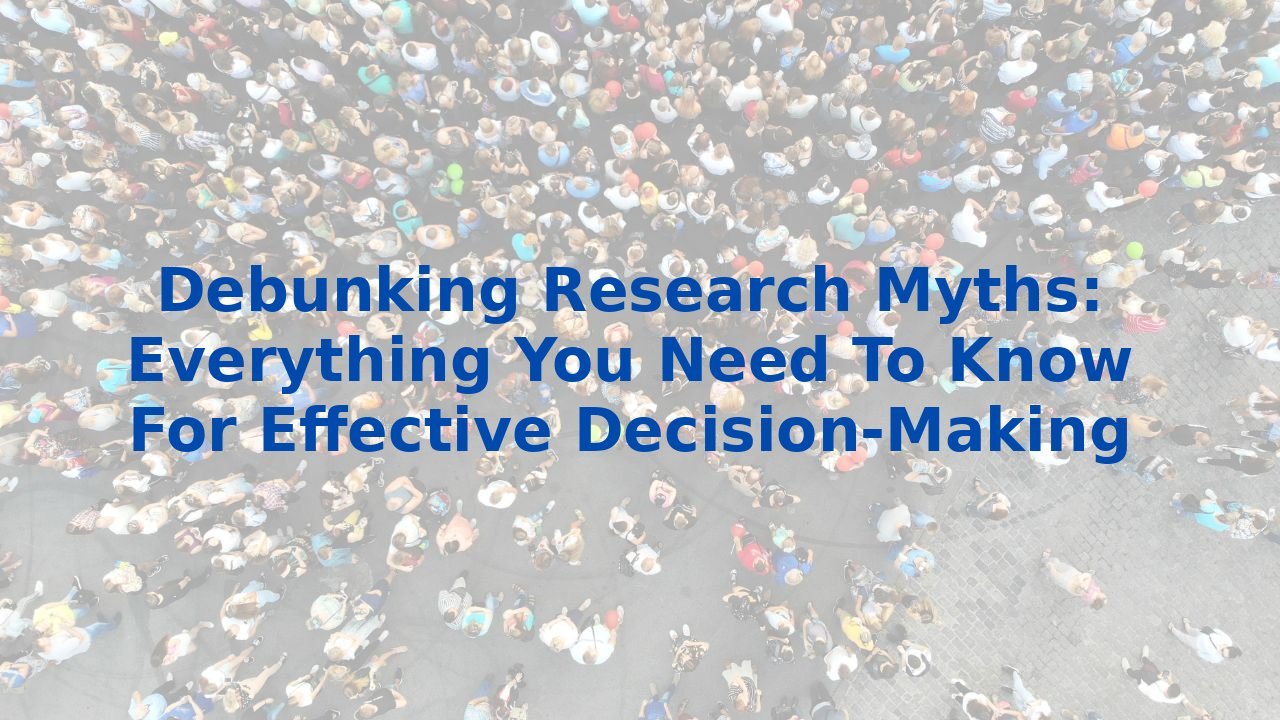Debunking Research Myths: Everything You Need To Know For Effective Decision-Making
Debunking Research Myths: A Guide for Decision-Makers
In a world overflowing with information, decision-makers often grapple with navigating the complex realm of research. To make informed choices, it's crucial to recognize common misconceptions surrounding the research process. Understanding these myths is not just beneficial for researchers; it can immensely enhance business processes, especially when integrated with Artificial Intelligence (AI). Let’s set the record straight.
Research Doesn't Provide Definitive Answers
One of the biggest myths about research is the expectation that it delivers definitive answers. In reality, research often provides nuanced insights that merely scratch the surface. This ambiguity can lead to a series of new questions rather than a clear-cut solution. In the context of business, this means that leaders must embrace complexity and be open to ongoing exploration, learning, and adaptation. AI can play a pivotal role here; its data analysis capabilities can sift through vast amounts of information to present insights that help in decision-making, thus facilitating an ongoing dialogue within organizations.
Single Studies Aren't Silver Bullets
Another prevalent misconception is that a single study can offer a universal solution. Scientific understanding evolves through multiple studies and replications. One study is rarely the final word—think of it as one piece of a much larger puzzle. For businesses, relying on a singular piece of research can lead to flawed strategies. By using AI, companies can aggregate insights from numerous studies, applying complex algorithms to yield more holistic perspectives. This approach leads to better-informed, data-driven decisions in various operational processes.
Correlation ≠ Causation
Business leaders must also be wary of confusing correlation with causation. Just because two factors appear related does not mean one causes the other; understanding the underlying context is crucial. AI can help decipher these relationships, providing analyses that highlight the nuances between correlated elements. For instance, by deploying predictive analytics, businesses can better understand the factors affecting sales trends rather than assuming a straightforward relationship.
Published ≠ Perfect
Even peer-reviewed research has its limitations. Validating findings through critical evaluation is crucial, as the publication process does not guarantee that all variables have been accounted for. In a business context, AI's ability to continuously analyze new data can uncover gaps in existing studies or highlight when a methodology may be insufficient. This iterative learning process can thus refine business operations, ensuring decisions are based on comprehensive and current information.
Importance of Qualitative Research
Many decision-makers gravitate towards quantitative data, which can overshadow the importance of qualitative research. Qualitative methods provide deeper context and insights that numbers alone cannot convey. Effective integration of AI into both quantitative and qualitative frameworks can reveal stories behind the data. For example, AI-driven sentiment analysis can assess customer feedback that complements traditional sales figures, equipping businesses with a more rounded understanding of how to improve their offerings.
AI: Elevating Business Processes
Embracing AI not only enhances decision-making but also streamlines various business processes across the board. From customer support to human resources, AI can handle repetitive tasks, analyze employee data for performance improvements, and even personalize customer experiences. Automation of mundane tasks allows human talent to focus on strategic, creative aspects—unlocking potential that can drive an organization forward. For instance, AI can generate reports that illuminate inefficiencies in operational workflows, providing actionable insights that can lead to significant performance enhancements.
The Case for Employee Training in AI
With the rapid pace of AI integration into business practices, it's imperative to invest in training your employees. Upskilling staff not only prepares them for the future of work, but it also fosters a culture of innovation. Employees who understand AI can leverage its capabilities in their roles, leading to increased productivity and enhanced job satisfaction. Comprehensive training programs can transform a workforce, equipping teams with the necessary skills to navigate and implement AI technologies effectively.
Understanding the realities of research and the power of AI can revolutionize the way businesses operate.
In conclusion, as you navigate the complexities of decision-making, keep these research myths in mind and consider how AI can refine your processes. It’s about making informed decisions that drive innovation and efficiency at every level. What other research myths have you encountered in your work? Share your experiences and insights in the comments!



